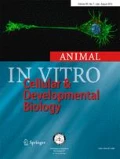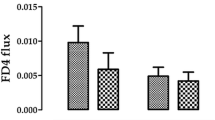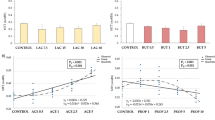Abstract
Short-chain fatty acids (SCFAs) produced by microbial fermentation of dietary fibers are utilized by intestinal epithelial cells to provide an energy source for the ruminant. Although the regulation of mRNA expression and inflammatory response involved in SCFAs is established in other animals and tissues, the underlying mechanisms of the inflammatory response by SCFAs in goat jejunum epithelial cells (GJECs) have not been understood. Therefore, the objective of the study is to investigate the underlying mechanisms of the effects of SCFAs on SCFA transporters and inflammatory response in GJECs. These results showed that the acetate, butyrate, and SCFA concentration were markedly reduced in GJECs (p < 0.01). In addition, the propionate concentration was significantly decreased in GJECs (p < 0.05). The mRNA abundance of monocarboxylate transporter 1 (MCT1), MCT4, NHE1, and putative anion transporter 1 (PAT1) was elevated (p < 0.05) by 20 mM SCFAs at pH 7.4 compared with exposure to the pH group. The anion exchanger 2 (AE2) was increased (p < 0.05) by 20 mM SCFAs at pH 6.2. The mRNA abundance of vH+ ATPase B subunit (vH+ ATPase) was attenuated by SCFAs. For inflammatory responses, IL-1β and TNF-α were increased with SCFAs (p < 0.05). In addition, IκBα involved in NF-κB signaling pathways was disrupted by SCFAs. Consistently, p-p65 signaling molecule was enhanced by adding SCFAs. However, IL-6 was attenuated by adding SCFAs (p < 0.05). Furthermore, p-ErK1/2 mitogen-activated protein kinase (MAPK) signaling pathway was downregulated by adding SCFAs. In conclusion, these novel findings demonstrated that mRNA abundance involved in SCFA absorption is probably associated to SCFAs and pH value, and mechanism of the inflammatory response by SCFAs may be involved in NF-κB and p-ErK1/2 MAPK signaling pathways in GJECs. These pathways may mediate protective inflammation response in GJECs.





Similar content being viewed by others
References
Albrecht E, Kolisek M, Viergutz T, Zitnan R, Schweigel M (2008) Molecular identification, immunolocalization, and functional activity of a vacuolar-type H(+)-ATPase in bovine rumen epithelium. J Comp Physiol B 178(3):285–295
Aschenbach JR, Penner GB, Stumpff F, Gäbel G (2011) Ruminant nutrition symposium: role of fermentation acid absorption in the regulation of ruminal pH. J Anim Sci 89(4):1092–1107. https://doi.org/10.2527/jas.2010-3301
Böcker U, Nebe T, Herweck F, Holt L, Panja A, Jobin C, Rossol S, Sartor R B, Singer MV (2003) Butyrate modulates intestinal epithelial cell-mediated neutrophil migration. Clin Exp Immunol 131(1):53–60. https://doi.org/10.1046/j.1365-2249.2003.02056.x
Bondzio A, Gabler C, Badewien-Rentzsch B, Schulze P, Martens H, Einspanier R (2011) Identification of differentially expressed proteins in ruminal epithelium in response to a concentrate supplemented diet. Am J Physiol Gastrointest Liver Physiol 301(2):G260–G268. https://doi.org/10.1152/ajpgi.00304.2010
Erwin ES, Marco GJ, Emery EM (1961) Volatile fatty acid analyses of blood and rumen fluid by gas chromatography. J Dairy Sci 44(9):1768–1771
Etschmann B, Heipertz KS, von der Schulenburg A, Schweigel M (2006) A vH+-ATPase is present in cultured sheep ruminal epithelial cells. Am J Physiol Gastrointest Liver Physiol 291(6):G1171–9
Dagmar K, Thomas S (2006) NF-κB and cytokines. Vitam Horm 74:283–300
George SP, Wang Y, Mathew S, Srinivasan K, Khurana S (2007) Dimerization and actin-bundling properties of villin and its role in the assembly of epithelial cell brush borders. J Biol Chem 282(36):26528–26265. https://doi.org/10.1074/jbc.M703617200
Hadjiagapiou C, Schmidt L, Dudeja PK, Layden TJ, Ramaswamy K (2000) Mechanism(s) of butyrate transport in Caco-2 cells: role of monocarboxylate transporter 1. Am J Physiol Gastrointest Liver Physiol 279(4):G775–G780. https://doi.org/10.1152/ajpgi.2000.279.4.G775
Hamer HM, De Preter V, Windey K, Verbeke K (2012) Functional analysis of colonic bacterial metabolism: relevant to health? Am J Physiol Gastrointest Liver Physiol 302:1–9
Hass R, Busche R, Luciano L, Reale E, Engelhardt WV (1997) Lack of butyrate is associated with induction of BAX and subsequent apoptosis in the proximal colon of guinea pig. Gastroenterology 112(3):875–881. https://doi.org/10.1053/gast.1997.v112.pm9041249
Ihara T, Tsujikawa T, Fujiyama Y, Bamba T (2000) Regulation of PepT1 transporter expression in the rat small intestine under malnourished condition. Digestion 61(1):59–67. https://doi.org/10.1159/000007736
Inan MS, Rasoulpour RJ, Yin L, Hubbard AK, Rosenberg DW, Giardina C (2000) The luminal short-chain fatty acid butyrate modulates NF-B activity in a human colonic epithelial cell line. Gastroenterology 118(4):724–734. https://doi.org/10.1016/S0016-5085(00)70142-9
Kim MH, Kang SG, Park JH, Yanagisawa M, Kim CH (2013) Short-chain fatty acids activate GPR41 and GPR43 on intestinal epithelial cells to promote inflammatory responses in mice. Gastroenterology 145(2):396–406. https://doi.org/10.1053/j.gastro.2013.04.056
Kles KA, Chang EB (2006) Short-chain fatty acids impact on intestinal adaptation, inflammation, carcinoma, and failure. Gastroenterology 130(2):S100–S105. https://doi.org/10.1053/j.gastro.2005.11.048
Le PE, Loison C, Struyf S, Springael JY, Lannoy V, Decobecq ME, Brezillon S, Dupriez V, Vassart G, Van Damme J, Parmentier M, Detheux M (2003) Functional characterization of human receptors for short chain fatty acids and their role in polymorphonuclear cell activation. J Biol Chem 278(28):25481–25489. https://doi.org/10.1074/jbc.M301403200
Leonhard-Marek S, Stumpff F, Martens H (2010) Transport of cations and anions across forestomach epithelia: conclusions from in vitro studies. Animal 4(07):1037–1056. https://doi.org/10.1017/S1751731110000261
Lu Z, Yao L, Jiang Z, Aschenbach JR, Martens H, Shen Z (2016) Acidic pH and short-chain fatty acids activate Na+ transport but differentially modulate expression of Na+/H+ exchanger isoforms 1, 2, and 3 in omasal epithelium. J Dairy Sci 99(1):733–745. https://doi.org/10.3168/jds.2015-9605
Macia L, Thorburn AN, Binge LC, Marino E, Rogers KE, Maslowski KM, Vieira AT, Kranich J, Mackay CR (2012) Microbial influences on epithelial integrity and immune function as a basis for inflammatory diseases. Immunol Rev 245(1):164–176. https://doi.org/10.1111/j.1600-065X.2011.01080.x
Maslowski KM, Mackay CR (2011) Diet, gut microbiota and immune responses. Nat Immunol 12(1):5–9. https://doi.org/10.1038/ni0111-5
Maslowski KM, Vieira AT, Ng A, Kranich J, Sierro F, Yu D, Schilter HC, Rolph MS, Mackay F, Artis D, Xavier RJ, Teixeira MM, Mackay CR (2009) Regulation of inflammatory responses by gut microbiota and chemoattractant receptor GPR43. Nature 461(7268):1282–1286. https://doi.org/10.1038/nature08530
Metzler-Zebeli BU, Hollmann M, Sabitzer S, Podstatzky-Lichtenstein L, Klein D, Zebeli Q (2013) Epithelial response to high-grain diets involves alteration in nutrient transporters and Na+/K+-ATPase mRNA expression in rumen and colon of goats. J Anim Sci 91(9):4256–4266. https://doi.org/10.2527/jas.2012-5570
Miyazawa K, Hondo T, Kanaya T, Tanaka S, Takakura I, Itani W, Rose MT, Kitazawa H, Yamaguchi T, Aso H (2010) Characterization of newly established bovine intestinal epithelial cell line. Histochem Cell Biol 133(1):125–134. https://doi.org/10.1007/s00418-009-0648-3
Oh DY, Talukdar S, Bae EJ, Imamura T, Morinaga H, Fan W, Li P, Lu WJ, Watkins SM, Olefsky JM (2010) Gpr120 is an omega-3 fatty acid receptor mediating potent anti-inflammatory and insulin-sensitizing effects. Cell 142(5):687–698. https://doi.org/10.1016/j.cell.2010.07.041
Scheidereit C (2006) IkappaB kinase complexes: gateways to NF-kappaB activation and transcription. Oncogene 25(51):6685–6705. https://doi.org/10.1038/sj.onc.1209934
Scheppach W (1996) Treatment of distal ulcerative colitis with short-chain fatty acid enemas. A placebo-controlled trial. German-Austrian SCFA Study Group. Dig Dis Sci 41(11):2254–2259. https://doi.org/10.1007/BF02071409
Steele MA, Vandervoort G, AlZahal O, Hook SE, Matthews JC, McBride BW (2011) Rumen epithelial adaptation to high-grain diets involves the coordinated regulation of genes involved in cholesterol homeostasis. Physiol Genomics 43(6):308–316. https://doi.org/10.1152/physiolgenomics.00117.2010
Somers J, Smith C, Donnison M, Wells DN, Henderson H, McLeay L, Pfeffer PL (2006) Gene expression profiling of individual bovine nuclear transfer blastocysts. Reproduction 131(6):1073–1084
Tedelind S, Westberg F, Kjerrulf M, Vidal A (2007) Anti-inflammatory properties of the short-chain fatty acids acetate and propionate: a study with relevance to inflammatory bowel disease. World J Gastroenterol 13(20):2826–2832. https://doi.org/10.3748/wjg.v13.i20.2826
Thwaites DT, Anderson CM (2007) H+-coupled nutrient, micronutrient and drug transporters in the mammalian small intestine. Exp Physiol 92(4):603–619. https://doi.org/10.1113/expphysiol.2005.029959
Wu J, Zhou Z, Hu Y, Dong S (2012) Butyrate-induced GPR41 activation inhibits histone acetylation and cell growth. J Genet Genomics 39(8):375–384. https://doi.org/10.1016/j.jgg.2012.05.008
Yan L, Zhang B, Shen Z (2014) Dietary modulation of the expression of genes involved in short-chain fatty acid absorption in the rumen epithelium is related to short-chain fatty acid concentration and pH in the rumen of goats. J Dairy Sci 97(9):5668–5675. https://doi.org/10.3168/jds.2013-7807
Yang W, Shen Z, Martens H (2012) An energy-rich diet enhances expression of Na+/H+ exchanger isoform 1 and 3 messenger RNA in rumen epithelium of goat. J Anim Sci 90(1):307–317. https://doi.org/10.2527/jas.2011-3854
Funding
This study was supported by the China Agriculture Research System (CARS-36) and the National Natural Science Foundation of China (No. 31572430).
Author information
Authors and Affiliations
Corresponding author
Ethics declarations
Animal slaughter followed the Ethics Committee of the Institute of Yangzhou University.
Additional information
Editor: Tetsuji Okamoto
Rights and permissions
About this article
Cite this article
Zhan, K., Jiang, M., Gong, X. et al. Effect of short-chain fatty acids on the expression of genes involved in short-chain fatty acid transporters and inflammatory response in goat jejunum epithelial cells. In Vitro Cell.Dev.Biol.-Animal 54, 311–320 (2018). https://doi.org/10.1007/s11626-017-0226-2
Received:
Accepted:
Published:
Issue Date:
DOI: https://doi.org/10.1007/s11626-017-0226-2




